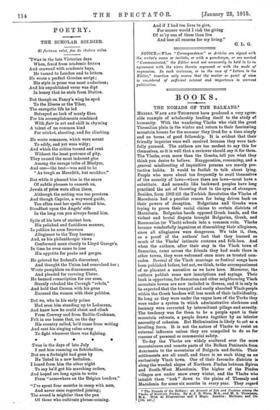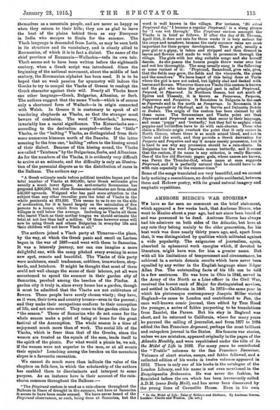B 0 0 K S.
THE NOMADS OF THE BALKANS.*
MESSRS. WACE AND THOMPSON have produced a very agree- able example of scholarship lending itself to the study of humanity. With the wandering Vlachs who visit the great Thessalian plain in the winter and return to their fascinating mountain homes for the summer they lived for a time simply and on terms of good fellowship. It is evident that their friendly inquiries were well received because they were tact- fully pursued. The authors are too modest to say this for themselves, so it is well that a reviewer should say it for them. The Vlachs, even more than the Greeks, tell you what they think you desire to believe. Exaggeration, romancing, and a general misdirecting of inquisitive persons are merely pro- tective habits. It would be foolish to talk about lying. People who move about too frequently to avail themselves of the security of laws—where there are laws—must have a substitute. And nomadic like backward peoples have long practised the art of throwing dust in the eyes of strangers. Besides, from 1903 till the Turkish Revolution the Vlachs of Macedonia bad a peculiar reason for being driven back on their powers of deception. Bulgarians and Greeks were trying to prove their racial claims to certain districts of Macedonia. Bulgarian bands opposed Greek bands, and the violent and brutal dispute brought Bulgarian, Greek, and Roumanian (or Vlach) schools into a common ruin. Vlachs became wonderfully ingenious at dissembling their allegiance, since all allegiances were dangerous. We take it, then, as a proof of the authors' tact that they learned so much of the Vlachs' intimate customs and folk-lore. And when the authors, after their stay in the Vlach town of Samarina, came across the friends they had made there in other towns, they were welcomed once more as trusted com- rades. Several of the Vlach marriage or festival songs have been published before, but not, we think, to the accompaniment of so pleasant a narrative as we have here. Moreover, the authors publish some new inscriptions and sayings. Their book is opportune, for Samarina and other neighbouring Vlach mountain towns are now included in Greece, and it is only to be expected that the tranquil and easily absorbed Vlach people within the Greek borders will lose much of their individuality. So long as they were under the vague laws of the Turks they were under a system in which administrative slackness and leniency were corrected by intermittent pillage and severity. The tendency was for them to be a people apart in their mountain retreats, a people drawn together by an interior necessity of cohesion. But Hellenization is likely to act as a levelling force. It is not the nature of Vlachs to resist an external influence unless they are compelled to do so for reasons of personal or commercial safety.
To-day the Vlachs are widely scattered over the more mountainous and remote parts of the Balkan Peninsula from A.carnania to the mountains of Bulgaria and Serbia. Their settlements are all small, and there is no such thing as an exclusively Vlach town. One of their favourite districts is along the wooded slopes of Northern Pindua between Epirus and South-West Macedonia. The higher of the Pindas villages are under snow every winter, and the Vlachs who inhabit them "trek" down to the plains of Tbesaaly and Macedonia for some six months in every year. They regard • Tt, Nomads of the Balkans: an Account of W. and Customs among Ms Flash, of Northsru Pindus. By A. S. B. Waco, MA.. and M. Et Thompson. M.A. With 42 Illustrations and S brain. London: Methuen and Co. [Ms. net.] themselves as a mountain people, and are never so happy as when they return to their hills; they are as glad to leave the heat of the plains behind them as any European in India who escapee to Simla for the summer. The "Vlach language is descended from Latin, as may be seen both in its structure and its vocabulary, and is closely allied to Roumanian, of which it is in fact a dialect. The name of the chief province of Roumania—Wallachia—tells its own tale. Vlach seems not to have been written before the eighteenth century, when a Greek script was introduced. Since the beginning of the national movement, about the middle of last century, the Roumanian alphabet has been used. It is to be hoped that no weak passion for symmetry will induce the Greeks to try to compel the Vlache of Greece to readopt the Greek character against their will. Nearly all Vlachs know one other language—Greek, Bulgarian, Albanian, or Serb. The authors suggest that the name Vlach—which is of course only a shortened form of Wallach—is in origin connected with Welsh. In Greece it is customary to speak of all wandering shepherds as Vlachs, so that the stranger must beware of confusion. The word " Kutsovlach," however, invariably has a racial significance. The Kutsovlachs are— according to the derivation accepted—either the "little" Vlachs, or the "halting" Vlachs, as distinguished from their more numerous kinsmen north of the Danube. If the latter meaning be the true one," halting" refers to the hissing sound of their dialect. Because of this hissing sound, the Vlachs are called " Tsintsars " by the Bulgarians, Serbs, and Albanians. As for the numbers of the Vlachs, it is evidently very difficult to arrive at an estimate, and the difficulty is only an illustra- tion of the perennial dispute as to the distribution of races in the Balkans. The authors say " A Greek estimate made before political troubles began put the total number of Vlachs at 600,000; later Greek estimates give usually a much lower fiance. An enthusiastic Roumanian has proposed 2,800,000, but other Roumanian estimates are from about e30,000 upwards. Weigand who has paid more attention to the subject than any other traveller puts the total of Vlachs in the whole peninsula at 973,620. This seems to us to err on the aide of moderation, for it is based largely on the calculation of five persons to a house, which from our own experience of Vlach villages is well below the average. Including as Vlachs all those who learnt Vlach as their mother tongue we should estimate the total at not less than half a million. Of these however some will now be using Greek and others Bulgarian in everyday life and their children will not know Vlach at all."
The authors joined a Vlach party at Tirnavos—the place, by the way, at which the Greek panic and recoil on Larissa began in the war of 1697—and went with them to Samarina. It was a leisurely journey, nor can one imagine a more delightful one, with the camp pitched every evening in some new spot, remote and beautifuL The Vlachs of this party were muleteers, small tradesmen, cobblers, ironworkers, shep- herds, and butchers. It might be thought that most of them could not well change the scene of their labours, yet all were accustomed to spend the summer in their garden city of Samarina, perched among the beeches of the Pindus. A garden city it truly is, since every house has a garden, though it must be admitted that the Vlachs are not cultivators of flowers. These people have surely chosen wisely ; they have, as it were, their town and country houses—even to the poorest ; and they make their occupations conform to their conception of life, and not rice-versa. They come to the garden cities for "the season." Those of Samarina who do not come for the whole season make a point of being at home for the great festival of the Assumption. The whole season is a time of enjoyment much more than of work. The social life of the Vlachs, which is freer than that of the Greeks, since the women are treated as the equals of the men, lends itself to the spirit of the picnic. For what would a picnic be, we ask, if the women were net superior to the men, or at all events their equals ? Lunching among the beeches on the mountain slopes is a favourite recreation.
We cannot do much more than indicate the value of the chapters on folk-lore, in which the scholarship of the authors has enabled them to discriminate and interpret to some purpose. As an instance here is their account of the rain- charm common throughout the Balkans
:-
"The rim:rand custom is used as a rain-charm throughout the Balkans in times of drought in the summer, but here at Samarina it seems to have been made annual. We have never heard of the Pie/pi/end observances, as such, being done at Samarina, but the word is well known in the village. For instance, 'Mi adrai
Pim:moil I became a regular Pirpirueol,' is a slang phrase for 'I was wet through.' The Pirpirand custom amongst the Vlachs is in brief as follows. If after the clay of St. Thomas, April 21st, it does not rain for three weeks it is very serious for the crops and meadows, because the early summer rains are most important for their proper development. Then a girl, usually a poor girl or a gipsy, ie taken and stripped and then dressed in leaves and flowers and made to walk ua procession through the village. The girls with her sing suitable songs and she herself dances. As she passes the houses people throw water over her and wet her thoroughly. The song usually sung is the following or some variant of it •PirpirunS, Sarandunii, give rain, give, that the fields may grow, the fields and the vineyards, the grass and the meadows.' We have heard of this being done at Torte whore the girl is now not naked, but lightly clad and decked with leaves and flowers. Wherever there are Vlachs this custom is known and the girl who takes the principal part ia called Pirpirund, Perpuni, or Paparun:f. In Northern acet, but not south of Epirus and Tlsessaly, it is known as Porperuna, tomer:a, Papparuna and Porpetira. It flourishes in Bulgaria In the east as Psperuda and in the north as Pomperega. In Roumania it called taparudA or Pdpaugd, and in Service and Dalmatia Dada. or Dadule. The origin of the custom has been claimed by all these races. The Roumanians, and Vlachs point out that Rival-sad and Pirpirund are words that occur in their language, and mean 'poppy' and 'butterfly,' hit they fail to explain whist poppies and butterflies have to do with rain-charms. Those who claim a Hellenic origin overlook the point that it only occurs in North Greece, where there is so much mixed blood, and not in Crete and the south, and they provide a Greek derivation for Porperic and Porpatira and say it means merely procession, but it is hard to see why any procession should be a rain-charm. In Bulgarian too the word Pepseuda means butterfly, and it seems that the custom, if its name is any criterion, is really Slavonic. One of the few old Slavonic pagan gods, whose names are known, was Perlin the Thunder-God, whose name at once suggests Pirpirund, and it is perfectly natural that he should have to do with rain especially in the summer-time."
Some of the songs translated are very beautiful, and we cannot help noticing a resemblance, no doubt quite accidental, between them and Hebrew poetry, with its grand natural imagery and emphatic repetitions.



































 Previous page
Previous page